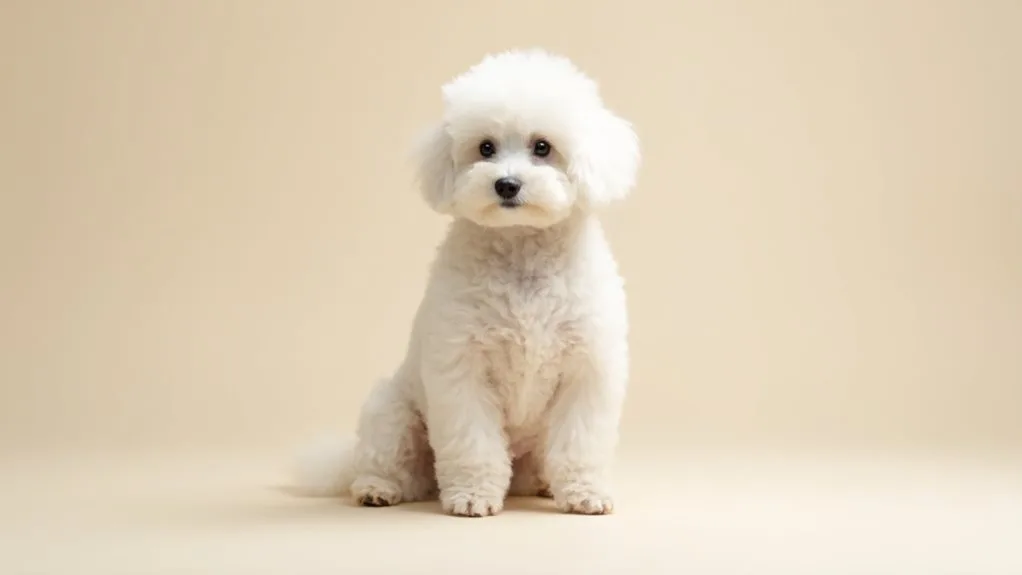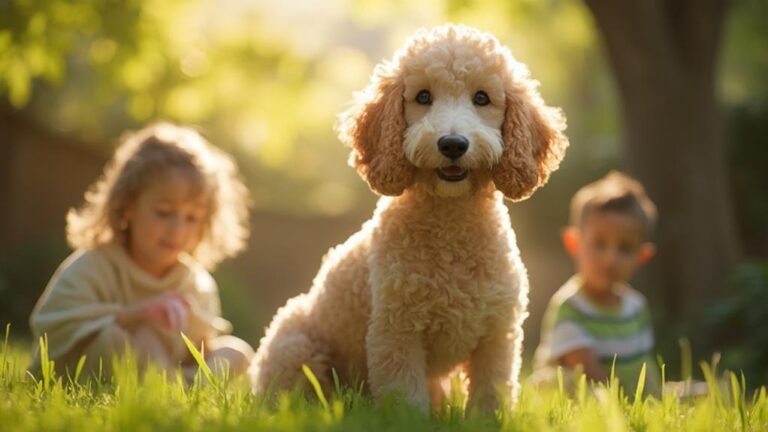Toy Poodle Weight: What’s the Perfect Size For This Breed

When you’re seeking the perfect Toy Poodle weight, you’ll want one weighing between 6 and 9 pounds—a delicate balance of grace and liveliness. These miniature companions embody elegance in a compact frame, standing under 10 inches tall with a physique that speaks volumes about their refined breeding.
Their weight journey is fascinating: from tiny 2-pound puppies to fully grown adults, they develop with genetic precision that’s both predictable and wonderfully unique. You’ll notice their size isn’t just about numbers, but about the vibrant spirit packed into their small form.
Each Toy Poodle carries a world of personality that transcends their petite dimensions, promising a bond that’s deeper than mere measurements suggest. Your next adventure awaits in understanding their exquisite scale.
Understanding Toy Poodle Size Standards

When exploring the world of Toy Poodles, understanding their size standards becomes essential for potential owners and breed enthusiasts. These delicate dogs represent a unique blend of elegance and compact design, carefully defined by precise breed standards.
The AKC recognizes Toy Poodles as a distinct category, typically measuring under 10 inches tall and weighing between 6 to 9 pounds when fully grown.
Genetics play a profound role in determining your Toy Poodle’s ultimate size and proportions. You’ll find that weight range can vary subtly within established breed standards, influenced by parental lineage and individual genetic markers.
Serious breeders meticulously track these characteristics, ensuring each puppy represents the breed’s refined aesthetic.
While size standards provide a general framework, individual dogs might slightly deviate. Your Toy Poodle’s adult weight isn’t just a number—it’s a reflection of careful breeding, nutrition, and genetic inheritance.
Understanding these nuanced standards helps you appreciate the breed’s complexity, recognizing that each dog carries a unique genetic story within its compact frame.
Growth Stages and Weight Milestones

Your Toy Poodle’s journey from a tiny puppy to a fully grown adult is a fascinating progression of weight and size milestones. Each stage of growth reveals subtle changes that reflect your pup’s unique genetic blueprint, transforming before your eyes with delicate precision.
During the early weeks, weight milestones become your roadmap, tracking your toy poodle’s development. At eight weeks, most puppies weigh between 1.8 and 2.4 pounds, a delicate stage where nutrition plays a critical role.
By sixteen weeks, they’ll typically reach 4 to 5.5 pounds, signaling considerable growth and potential. Your veterinary check-ups will help monitor these weight shifts, ensuring your puppy develops healthily.
Around six months, your toy poodle reaches approximately 75% of its adult size, with weight hovering between 4.5 and 6.75 pounds. The average weight stabilizes near 6 to 9 pounds by twelve months, marking full maturity.
Genetics greatly influence these growth stages, determining your pup’s ultimate size and weight trajectory. Each milestone represents more than numbers—it’s a reflection of your poodle’s individual journey, revealing the intricate dance of development.
Genetics Impact on Breed Dimensions

The intricate genetic landscape of Toy Poodles shapes their dimensional characteristics with remarkable precision.
When you explore the genetic inheritance of these delightful companions, you’ll discover a complex world where size and weight are predetermined by ancestral blueprints.
Your puppy’s genetic makeup determines more than just physical dimensions; it’s a roadmap of potential health and structural characteristics.
A reputable breeder understands this genetic inheritance intimately, carefully selecting breeding pairs to maintain ideal size and health standards.
Consider these fascinating genetic influences:
- Parental lineage directly impacts a Toy Poodle’s weight range
- Recessive genes can unexpectedly modify size expectations
- Specific genetic markers determine bone structure and potential growth
- Inherited traits from multiple generations shape final physical dimensions
Each Toy Poodle carries a unique genetic signature that whispers stories of generations past.
The delicate interplay between inherited traits creates a nuanced portrait of potential size and health.
Your understanding of genetics transforms from abstract concept to tangible reality when you observe how these microscopic instructions manifest in your beloved companion’s physical form.
Their size becomes a living narrative, written in the elegant language of genetic inheritance.
Healthy Weight Management Strategies

Every responsible Toy Poodle owner must prioritize maintaining their pet’s ideal weight through strategic management techniques. Your journey with your furry companion involves understanding how weight impacts their overall health and happiness.
Nutrition quality plays a vital role in keeping your Toy Poodle at a healthy weight, with balanced diet choices making all the difference.
| Age Stage | Weight Range | Feeding Strategy |
|---|---|---|
| Puppy | 4-6 lbs | Frequent small meals |
| Young Adult | 6-8 lbs | Controlled portions |
| Mature Adult | 6-9 lbs | Adult maintenance food |
Consulting your veterinarian becomes essential, as weight can vary based on individual factors. They’ll help you develop a personalized nutrition plan that supports your Toy Poodle’s unique needs. Pet insurance can provide additional support for managing potential weight-related health concerns.
Your commitment to monitoring diet, exercise, and overall wellness determines your Poodle’s long-term health. Small, consistent choices create a significant impact. Observe your pet’s body condition, adjust portions carefully, and remain attentive to subtle changes. Your thoughtful approach transforms routine care into a profound expression of love and dedication.
Nutrition for Optimal Size Development

Maintaining a healthy weight involves more than portion control—it requires strategic nutritional planning that supports ideal growth for Toy Poodles. Your puppy’s nutrition quality directly impacts their developmental trajectory, influencing not just size but overall vitality.
Breed standards suggest carefully selected nutrition that meets specific caloric needs, ensuring best growth through thoughtful dietary choices.
When considering your Toy Poodle’s diet, remember these essential nutritional strategies:
- Select high-quality puppy food specifically formulated for small breed development
- Consult with your veterinarian to customize nutritional plans
- Monitor portion sizes to prevent overfeeding and potential weight issues
- Balance protein, fat, and essential nutrients for sustained health
A veterinary consultation can help you navigate the complex landscape of canine nutrition. Your commitment to understanding your Toy Poodle’s unique dietary requirements transforms meal times from mere sustenance into a profound act of care.
Each carefully measured portion represents your dedication to supporting their growth, reflecting the intricate dance between nutrition and potential.
Health check-ups serve as key milestones, allowing professionals to assess your puppy’s nutritional journey and make nuanced adjustments.
Common Size-Related Health Considerations

Toy Poodles often face unique health challenges directly related to their diminutive size, presenting veterinarians and owners with nuanced medical considerations. Your poodle’s weight range and adult height can greatly impact their overall health trajectory.
While their compact frame makes them adorable companions, it also predisposes them to specific genetic health concerns that require vigilant monitoring.
| Health Concern | Impact | Prevention |
|---|---|---|
| Joint Issues | Mobility Limitation | Regular Exercise |
| Dental Problems | Nutritional Challenges | Professional Cleaning |
| Vision Complications | Sensory Restriction | Annual Eye Exams |
| Metabolic Disorders | Energy Management | Balanced Diet |
Understanding your toy poodle’s health means recognizing how their size influences potential medical risks. Regular vet visits become essential in detecting early warning signs of conditions like patellar luxation or progressive retinal atrophy.
Genetics play a considerable role in determining potential health vulnerabilities, making proactive care important.
Your tiny companion’s well-being depends on thorough attention to their unique physiological needs. By staying informed and maintaining consistent healthcare routines, you’ll help guarantee your toy poodle navigates potential size-related health challenges with resilience and liveliness.
Selecting the Right Toy Poodle

Discovering the perfect companion requires more than understanding your potential poodle’s health history—it demands careful consideration of individual characteristics and lifestyle compatibility.
When selecting a toy poodle, you’ll want to evaluate several key factors that influence your long-term connection and mutual happiness.
Your ideal toy poodle should harmonize with your unique rhythms and living environment. Consider these vital selection criteria:
- Weight range compatibility with your living space and personal preferences
- Genetics and potential inherited health traits
- Puppy weight trajectory and predicted adult size
- Nutritional needs and ability to maintain ideal diet
Understanding the subtle nuances of toy poodle selection means listening deeply to both your heart and practical considerations. Health check-ups become essential touchstones in this journey, revealing potential genetic predispositions and ensuring your future companion’s well-being.
Observe each potential puppy’s temperament, energy level, and interaction style. Watch how they move, respond to gentle touch, and engage with their environment.
These small moments reveal profound insights about their potential fit within your life’s intricate tapestry, transforming a simple selection process into a meaningful connection of mutual understanding and companionship.
Conclusion
Your Toy Poodle’s journey reflects life’s delicate balance—growth isn’t just about numbers, but nurturing potential. Each ounce represents love, care, and understanding. By embracing their unique growth path, you’ll forge a bond transcending mere weight charts.
Remember, these tiny companions carry immense spirit, transforming measurement into meaningful connection. Your commitment shapes their health, happiness, and the profound story you’ll write together.
FAQ: Toy Poodle Weight
The average size of a Toy Poodle typically ranges from 9 to 10 inches tall at the shoulder, and their weight usually falls between 6 to 9 lbs. Though Toy Poodles are small, oversized individuals can sometimes reach up to 10 lbs. The size range is crucial for maintaining the poodle breed standards as outlined by the AKC.
When compared to other breeds like the Toy Poodle, Miniature Poodles weigh significantly more, usually between 10-15 lbs. On the other hand, the larger Standard Poodle can weigh between 40-70 lbs. The Toy and Miniature Poodles are both smaller and lighter than their standard counterparts.
A Toy Poodle generally reaches its full height by around 6-8 months of age. However, weight gain and muscle development may continue until they are about a year old. Monitoring a growth chart can help pet parents ensure their pup is on track with typical poodle growth.
Several factors can influence a Toy Poodle’s weight, including genetics, diet, exercise, and overall poodle health. An oversized Toy Poodle may result from overfeeding or lack of exercise. Regular check-ups with a veterinary professional can help manage these factors effectively.
To maintain a healthy weight, ensure your poodle puppy’s diet is balanced with proper nutrients. Regular exercise, such as daily walks and playtime, will also meet their exercise needs. Routine groom sessions help monitor their overall health and weight, as poodles are prone to weight-related health issues.






